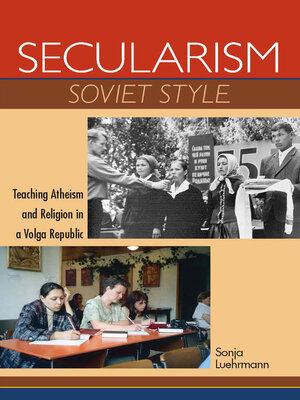Secularism Soviet Style
ebook ∣ Teaching Atheism and Religion in a Volga Republic · New Anthropologies of Europe
By Sonja Luehrmann

Sign up to save your library
With an OverDrive account, you can save your favorite libraries for at-a-glance information about availability. Find out more about OverDrive accounts.
Find this title in Libby, the library reading app by OverDrive.



Search for a digital library with this title
Title found at these libraries:
| Library Name | Distance |
|---|---|
| Loading... |
A study of the USSR's effort to build a society without gods or spirits that "greatly enhances our understanding of the post-Soviet revival of religion" (Review of Politics).
Combining archival research on atheist propaganda of the 1960s and 1970s with ethnographic fieldwork in the autonomous republic of Marij El in Russia's Volga region, Sonja Luehrmann examines how secularist culture-building reshaped religious practice and interreligious relations.
One of the most palpable legacies of atheist propaganda is a widespread didactic orientation among the population and a faith in standardized programs of personal transformation as solutions to wider social problems. This didactic trend has parallels in globalized forms of Protestantism and Islam but differs from older uses of religious knowledge in rural Russia. At a time when the secularist modernization projects of the twentieth century are widely perceived to have failed, Secularism Soviet Style emphasizes the affinities and shared histories of religious and atheist mobilizations.
Combining archival research on atheist propaganda of the 1960s and 1970s with ethnographic fieldwork in the autonomous republic of Marij El in Russia's Volga region, Sonja Luehrmann examines how secularist culture-building reshaped religious practice and interreligious relations.
One of the most palpable legacies of atheist propaganda is a widespread didactic orientation among the population and a faith in standardized programs of personal transformation as solutions to wider social problems. This didactic trend has parallels in globalized forms of Protestantism and Islam but differs from older uses of religious knowledge in rural Russia. At a time when the secularist modernization projects of the twentieth century are widely perceived to have failed, Secularism Soviet Style emphasizes the affinities and shared histories of religious and atheist mobilizations.







